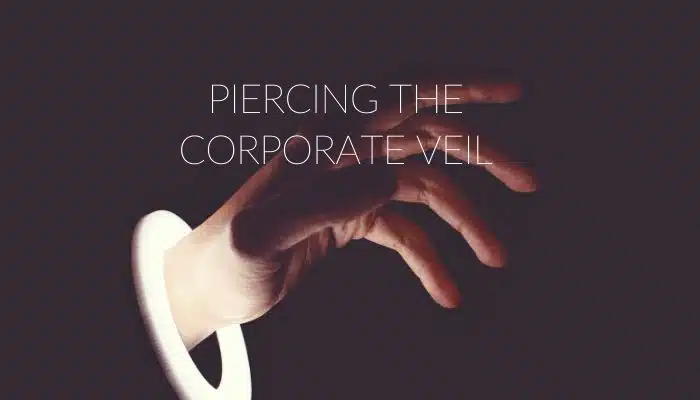In Australia, under the Corporations Act 2001(Cth) directors and shareholders are generally protected from personal liability and responsibility by the corporate veil. This is because corporations are separate legal entities from their members, and this limitation of liability is often one of the primary reasons for choosing a corporation as the corporate vehicle when setting up a company. With this being said, there are certain circumstances where courts may allow the corporate veil to be “pierced” and hold others in the corporate chain (such as members, directors or parent companies) liable. In today’s post, we will discuss what the corporate veil is, its implications and how it may be pierced.
Doctrine of Separate Legal Entity
In Australian law, an incorporated company is a distinct legal entity that is completely separate from its directors and shareholders. This has a number of legal implications, such as:
- A company itself can sue and be sued;
- A company debt is distinct from a private debt (such as that of a director);
- Company assets are not private assets; and
- A company can be liable in tort.
These are just a few instances of the implications of this doctrine. As a practical example, in instances where a company is going into liquidation (or has otherwise accrued substantial liabilities), under normal circumstances creditors are not able to access the personal assets of directors or members in order to satisfy outstanding debts.
Piercing the Veil
Under certain circumstances, a court may be willing to pierce the corporate veil. Taking the above example, this would mean that creditors and other thirds parties would be able to access the assets of its directors or members. In a corporate group, creditors may also be able to access the parent company’s assets. This is equally true for multinational companies. On the other hand, the court is also able to contribute to the company the knowledge and intentions of its directors and shareholders.
With this being said, piercing the corporate veil only occurs in very rare and exceptional circumstances. The Courts have not provided specific guidance of when the veil will be pierced, and the Corporations Act 2001(Cth) does not expressly deal with the topic. Based on case law, there are a few broad categories where the veil may be lifted, which are:
- Fraud and improper conduct: If a company is set up for the purpose of taking advantage of the veil, and not of actually trading, then the Court may lift it. This involves specific intent of the company to not give effect to transactions such as contracts or trading through a network of sham companies to ensure that debts are never payable – that is, criminal conduct.
- Avoiding a legal obligation: The Court may pierce the veil if the company is using the veil to avoid its legal obligations. For example, if the company owes money to a creditor but transfers assets to another related company so as to avoid having to pay the creditor, a court may deem that the creditor can pursue the related company.
- Agency: It is common for companies to act as a parent company for others. Where a subsidiary acts as an agent for a parent company, that parent company can be held liable, and the court may lift the corporate veil in order to hold it liable.
- Human rights issues: While this is certainly a developing area of law, it is interesting and important for multinational companies to keep in mind that courts have been willing to pierce the corporate veil in relation to human rights abuses that have occurred overseas, generally in relation to abuses by a subsidiary company operating in a poorer country with a poor human rights record. In a UK case, where Zambian citizens were seeking to pursue a UK parent company due to water-source contamination, (the Vedanta Resources water pollution case), the court stated that a parent company’s duty of care could extend to a person affected by the operation of a subsidiary.
Conclusion
While courts are reluctant to look behind a company’s separate legal personality to hold directors and members liable, it is important to understand what conduct can give rise to piercing the veil. It is important for all directors to nonetheless understand the level of liability they hold in running a company. If you are setting up a company, Harris Gomez Group can assist you in choosing the right business structure, and in understanding your legal obligations as a director.
Harris Gomez Group is a Common Law firm, with offices in Santiago, Bogotá, and Sydney. We also have legal teams in Peru, Bolivia, Ecuador, Brazil, and Argentina. Over the last 18 years, we have been supporting foreign companies with their growth in Australia and Latin America. Many of our clients are technology companies, service providers and engineering companies that focus on the mining, energy and infrastructure markets.
To better understand how we can support your management team in the Region, please contact us at hello@hgomezgroup.com







